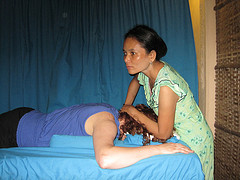Going in Debt to Take, Then Change Classes

Flickr: maxwellgaines
Should we require a degree (and the debt that comes with it) for things like massage therapy?
As the child of a nurse and someone who feels like I’m never going to be free of my student loans, I’m extra interested in this piece: “Nothing for Something: Does pushing higher education for everyone actually make it tougher for poor students to enter the middle class?” by Monica Potts over at The American Prospect. I frequently meet people in my neighborhood who are taking on brutal amounts of debt to study at for-profit colleges and the like:
…by requiring college courses in trades like heating and air installation and massage therapy that were once learned through an apprenticeship, students — especially poor students — end up wasting a lot of money and taking time out of their careers for little added benefit. If traditional colleges and universities aren’t teaching all students generalized, high-level skills that enable them to adapt to whatever working environment they find themselves in, then it’s hard to see what the value of obtaining a college degree is. We either need to start making sure all students leave college with those skills, or re-evaluate why it’s important for some career-oriented programs to be part of a college course and not an on-the-job training program…
If that trend continues, it’s only a matter of time until we start requiring even more schooling for careers that not long ago required only on-the-job training and licensing. This sort of degree inflation has already happened in some fields. Right now there are associate degree programs for some types of nurses, but there’s a rising call for all nurses to have four-year degrees. Some cities require teachers to have master’s degrees — nearly all states create economic incentives for teachers to get advanced degrees, even though there’s not much proof that they make teachers better. And the United States also routinely requires four-year degrees for careers, like accounting, that in other countries require only one- or two-year certification programs.




